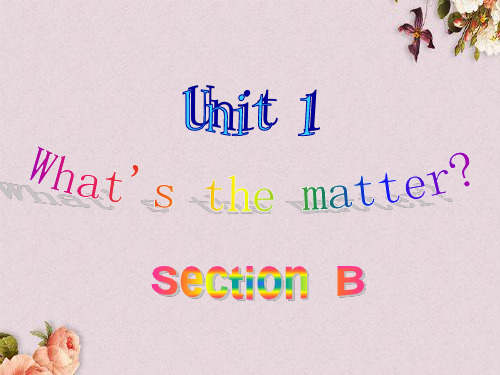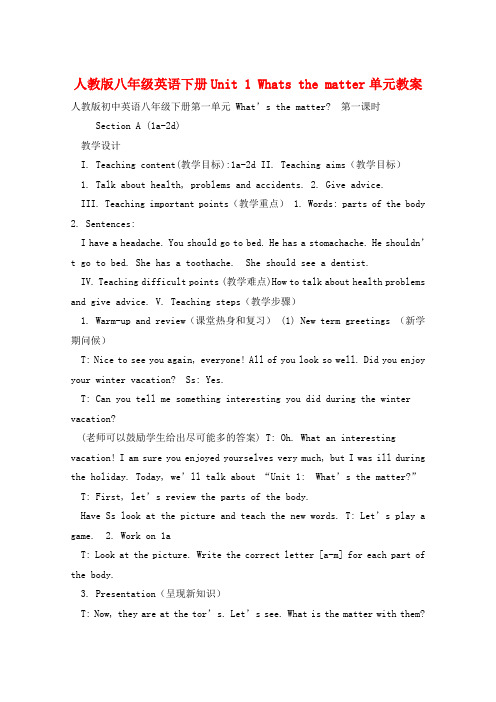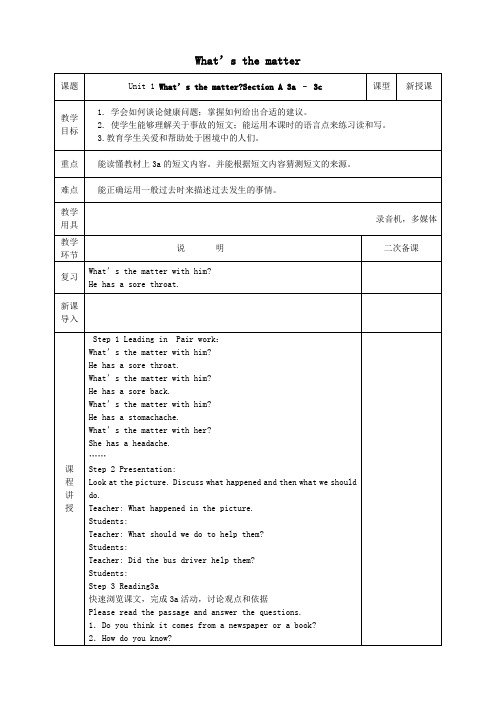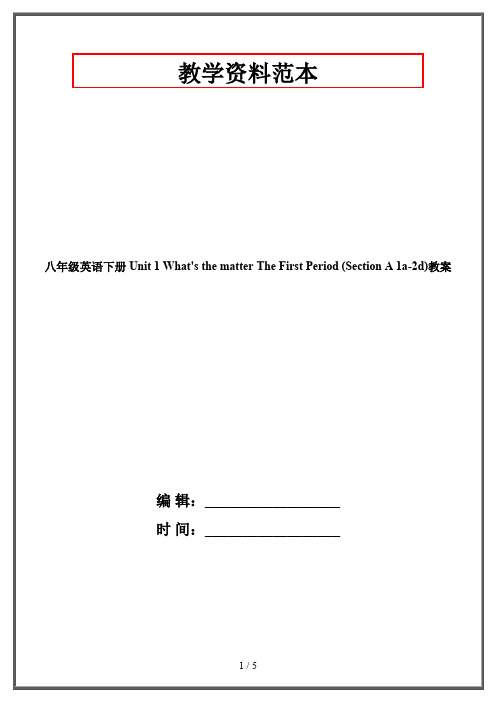山东省肥城市王庄镇初级中学八年级英语下册 Unit 1 What's the matter导学案(无
山东省肥城市汶阳镇初级中学八年级英语下册《Unit 1 What’s the matter Section B》课件

Answer the questions:
1. How do you feel if you have a flu?
2. What do you do if you have the flu?
See the doctor; Take some medicine; Drink hot water; Stay in bed for a few days.
3 There were many times when Aron almost lost his life because of accidents.
有好多次,阿伦差点因为意外丢掉性命。
I can’t forge the happy days when I was at university.
4 run out (of) 用尽 The money ran out. He ran out of his money. 5 cut off 切除 He has to cut off his broken leg or he
Because I hurt my leg.
Let’s read.
I am going to take this medicine.
Because I have a cold.
汉译英: 1.昨天上午九点,26路公交车正沿中华路行驶,这 时司机看到一位老人躺在路边。
At 9:00 a.m. yesterday, bus No.26 was going along Zhonghua Road when the driver saw an old man lying on the side of the road. 2.他旁边的一位妇女正在呼救。 A woman next to him was shouting for help. 3. 24岁的王平没有多想便停了车。 24-year-old Wang Ping stopped the bus without thinking twice. 4.他下了车问那妇女发生了什么事。 He got off and asked the woman what happened.
人教版八年级英语下册Unit 1 Whats the matter单元教案

人教版八年级英语下册Unit 1 Whats the matter单元教案人教版初中英语八年级下册第一单元 What’s the matter? 第一课时Section A (1a-2d)教学设计I. Teaching content(教学目标):1a-2d II. Teaching aims(教学目标)1. Talk about health, problems and accidents.2. Give advice.III. Teaching important points(教学重点) 1. Words: parts of the body2. Sentences:I have a headache. You should go to bed. He has a stomachache. He shouldn’t go to bed. She has a toothache. She should see a dentist.IV. Teaching difficult points (教学难点)How to talk about health problems and give advice. V. Teaching steps(教学步骤)1. Warm-up and review(课堂热身和复习) (1) New term greetings (新学期问候)T: Nice to see you again, everyone! All of you look so well. Did you enjoy your winter vacation? Ss: Yes.T: Can you tell me something interesting you did during the winter vacation?(老师可以鼓励学生给出尽可能多的答案) T: Oh. What an interesting vacation! I am sure you enjoyed yourselves very much, but I was ill during the holiday. Today, we’ll talk about “Unit 1: W hat’s the mat ter?” T: First, let’s review the parts of the body.Have Ss look at the picture and teach the new words. T: Let’s play a game. 2. Work on 1aT: Look at the picture. Write the correct letter [a-m] for each part of the body.3. Presentation(呈现新知识)T: Now, they are at the tor’s. Let’s see. What is the matter with them?We can also ask, What’s wrong with them? T: (help Ss answer) He has a cold.1T: What should he do?T: He should take some medicine.教师用同样的方法教授其他疾病及相关的建议:1. 胃/肚子疼2. 脖子疼3 头疼4. 嗓子疼, 喉咙疼5. 背疼 6. 感冒7. 发高/低烧 8.咳嗽9.牙痛 4. Work on 1cPresent the picture and have Ss to do the pair work. 总结各种疾病及如何给出建议和句型。
八年级英语下册Unit1What’sthematter第2课时SectionA3a_3c教案新版人教新目标版_

First discuss in groups. And then check the answers.
Step 4 Work on 3b
细读课文,按照3b活动要求进行判断。
Let’s read 3a again carefully and check the things that happened in the story.
Help the students find the key words and understand the sentences and passage.
Check the answers.
查漏补缺,解决学生存在的疑难问题
Do you have any questions? Let’s discuss. For example, stopped the bus without thinking.
Step 6 Language points:
1... when the driver saw an old man lying on the side of the road.
......这时司机看到一位老人正躺在路边。
你能看出“看到某人正在做某事”的句型吗?
see sb. do sth.看见某人做过某事
e.g. To their surprise, all the students pass the exam.
5. ... because they don’t want any trouble, ...
当trouble意为“困难;麻烦”时,是不可数名词。如:
I’m sorry to give you so much trouble.
e.g. I often see him draw a picture.
八年级英语下册 Unit 1 What's the matter Section A第1课时(1a

学习资料八年级英语下册 Unit 1 What'sthe matter Section A第1课时(1a-2d)教案(新版)人教新目标版班级:科目:Unit 1 What's the matter Section A第1课时(1a—2d)Section A 单词matter n.问题;事情stomachache n。
胃痛;腹痛foot n.脚;足neck n.颈;脖子stomach n。
胃;腹部throat n。
咽喉;喉咙fever n。
发烧lie v。
躺;平躺rest v。
& n。
放松;休息cough n。
& v。
咳嗽X—ray n。
X射线;X光toothache n.牙痛headache n。
头痛break n.间歇;休息hurt v。
(使)疼痛;受伤passenger n。
乘客;旅客off adv.& prep。
离开(某处);不工作;从……去掉onto prep.向;朝trouble n。
问题;苦恼hit v.(用手或器具)击;打herself pron.(she的反身代词)她自己短语have a cold 感冒have a stomachache 胃痛lie down 躺下take one’s temperature 量体温take breaks(take a break)休息have a fever 发烧to one’s surprise 使……惊讶的;出乎……意料get off 下车right away 立即;马上get into 陷入;参与句型1.—What’s the matter with Ben?本怎么了?—He hurt himself. He has a sore back。
他伤到了他自己,他背痛。
2。
—What should she do?她该怎么办?—She should take her temperature.她应该量下体温。
Section B 单词sick adj。
八年级英语下册 Unit 1 What’s the matter Section A 1a-1c课件

Names Nancy Sarah David
Ben Judy
Problems
have have
a
a cold
toothache
get a stomachache
have have a a really very sore sore throat
back
疾病名称的构成:1.部位ache
have a headache have a stomachache have a toothache have a backache 2. sore+ 部位 have a sore back
I have a sore back.
I have a backache.
fever high/low fever
What’s the matter with you? What’s wrong with you? What’s the trouble with you?
I have a fever. I have a temperature.
1a Look at the picture and write the correct letter [a-m] for each part of the body.
harm e back g ear i eye b foot a hand j head l leg c mouth dneck m nose kstomach f tooth
illness
cold bad cold
What’s the matter with you? What’s wrong with you? What’s the trouble with you?
I have a cold
八年级英语下册 Unit 1 What's the matter The First Period (Section A 1a-2d)教案

Do 2a. Have students listen and number the picture [1-5]in the order they hear. Then check the answer.
Step 4 Listen and Say (about 8 minutes)
Work on Section A 1b, listen and number the names [1-5].
Have students look at the picture and read 1c, and tell students that the girl talked too much yesterday and she has a very sore throat now. Then ask them look at the picture, practice saying other problems. For example: The boy eats too much ice cream and has a stomachache.
Teaching Difficult Points
1. Learn to talk about health problems by using“What’s the matter?Ihave a…”.
2. Learn to give appropriate advice to the certain health problems.
Have students workห้องสมุดไป่ตู้in pairs according to 1c and ask somepairsto act out their conversations.
山东省肥城市汶阳镇初级中学八年级英语下册《Unit 1 What’s the matter(第1课时
He should/shouldn’t
He has a toothache see a dentist eat ice cream. get an X-ray eat hot food. take some dedicine
A:What should I do if I have a …? B:You should …
sore throat
What’s the matter (with her)? She has a toothache.
What’s the matter(with him)? He Байду номын сангаасas a headache.
4
2
3
5
What’s the matter with Nancy?
Problem
3.头/牙/肚子疼 4.感冒 5.发烧 6.说的太多 7.太多雪
have a headache \toothache\stomachache have a cold have a fever talk too much too much snow
8.足够的水
enough water
9.躺下
lie down
10.休息
have a rest
11.喝加蜂蜜的热茶 12.看牙医 13.拍X光片
drink hot tea with honey see a dentist get an X-ray
14.量体温 15.在它上敷些药 16.听起来像 17.在周末 18.整个周末 19.需要休息 20.用同样的方式 21.没有移动
• 17.牙痛n • 18.量体温 • 19.头痛 n • 20.发烧 • 21.间歇;休息 n • 22.休息 • 23.(使)疼痛;受伤v • 24.乘客;旅客 n • 25.离开(某处);从..去掉 • 26.下车 • 27.使...惊讶的;出乎...意料 • 28.向;朝 prep • 29.问题,苦恼 n • 30.(用手或器具)击;打 v • 31.立即;马上
山东省肥城市潮泉镇初级中学人教版八年级英语下册教案:Unit1What‘sthematterSectionA(1a-2d)
课题Unit 1 What's the matter? Section A (1a-2d)课型New课时 1 总课时教学目标【知识目标】Important words:matter,stomachache,foot,neck,stomach,throat,fever,lie,rest,cough,X-ray,toothache,headache,break,hurtImportant phrases:have a stomachache/cold/fever/cough…,take one's temperature,liedown,take a break,go to a doctorImportant sentences:1.—What's the matter?—I have a cold.2.She has a very sore throat now.【能力目标】1.让学生们能够在谈论健康问题时使用“What's the matter with sb.?”的句型。
2.让学生们根据自己在语言方面的问题,给别人一些正确的建议。
3.让学生们选择一种健康的生活方式。
【情感目标】1.鼓励学生们通过结对练习和角色扮演来提高合作精神。
2.鼓励学生们更多地关注自己的生活方式和家庭成员的健康。
重点能够让学生们运用“What's the matter?I have a…”的句式来讨论健康问题,用“should”给出建议。
难点 1.学会使用“What's the matter?I have a…”的句式讨论健康问题。
2.学会针对确定的健康问题给出适当的建议。
教具准备An English textbook,a tape recorder, multimedia教学过程借鉴改进(完善提升) Step 1 Warm ing up and new words。
【最新经典文档】新目标八年级下册英语《Unit1What’sthematter?》Section
八下Unit1 What’s the matter? Section A(1a-2c)教学设计Teaching Aims:Knowledge Object:1. Ss can use the following words:head , ear, eye, mouth, nose, throat , neck, back, hand,arm, leg, tooth-teeth,foot-feet , matter, have a cold, stomachache, , backache,headache, toothache2. Ss can use the following sentence patterns:What’s the matter?I have a stomachache/I have a sore back./I have a cold/fever.He/She has a sore throat.What should I /he /she do?You /He /She should...,.Ability Object:1.Enable students to talk about health problems and give advice using target language.2.Improve students’ listening skill.Emotion Object:Let Ss know keeping healthy is important and learn to careabout others.Teaching Key Points:Learn how to talk about health, use have /has to talk abouthealth problemsTeaching Difficult Points:Learn the English names of different parts of human body and talk about varioushealth problems.Teaching Methods:1. Listening and speaking practice.2 .Autonomous and cooperative approach.Teaching Aids:CAITeaching Procedure:Before class: Listen to an English song.Step 1 Warming-up and check what students have learned beforeclass.1. Greet.2.Let’s enjoy a songStep 2 Presentation and practice.1.Lead inName the parts of the body to learn new words.2.Activity 1a(1)Work on Section A 1a students say one by one.(2)Check the answers.3.1b(1)Learn new words and talk about health problems板书单词短语(2)Pair workA.Make a dialogue in pairB.Show it(3)Listen to 1bA.Guessing and discussing in groupShow the pictures one by one and ask. Let’s listen and number the names 1-5.T: What’s the matter with them?What are their names?强调write the numbers of the students not for the conversations. For example, Sarah has a cold, we write 1 after Sarah.B.Listen to 1b and finish 1bC.Check the answer4.1c(1)Read together(2)Make conversations according to picture and role-play5.Work on 2a and 2b.(1)Look at these 5 pictures and disc uss what’s the matterwith them.(2)Listen to 2a and number the pictures in order.(3)Discuss what they should do板书What should … do? …should….(4)Listen to 2b and Match the problems with the advice6.Work on 2c(1)Pair work make conversations using the informationin 2a and 2b.(2)Show conversationsStep 3 Production1.Group work1.Role-play a conversation between the doctor and the patients.Suppose (假想) you are the school doctor, some studentsare ill, they ask for some advice.2.Show itStep 4 SummarizeT: Let’s have a quick summary. Let’s read it one by one. They are about health problems. How can we talk about them? What’s the matter? 看板书,齐读。
人教版八年级英语下册Unit1 What's the matter Section A1课件
advice
take your temperature lie down and rest drink some hot tea with honey see a dentist and get an X-ray put some medicine on it
A: What's the matter? B: My head feels very hot. A: Maybe you have a fever. B: Sounds ... A: You should ...
head+ache = headache (头痛) back+ache=backache(背痛) stomach +ache = stomachache(胃痛) ear+ache=earache (耳朵痛)
2. 主语+have/has+a+sore+发病部位 sore 是一个形容词,指的是身体某一部位的酸痛。
What other organs do you know?
head
face forehead
eyebrow eyes eyelash ear
nose lips
tooth teeth
tongue chin/jaw neck throat
shoulder arm(s) wrist hand finger stomach
A: Maybe they should take some medicine.
B: Sounds good.
2 3
4
1
5
2a
Listen and match the problems with the advice.
- 1、下载文档前请自行甄别文档内容的完整性,平台不提供额外的编辑、内容补充、找答案等附加服务。
- 2、"仅部分预览"的文档,不可在线预览部分如存在完整性等问题,可反馈申请退款(可完整预览的文档不适用该条件!)。
- 3、如文档侵犯您的权益,请联系客服反馈,我们会尽快为您处理(人工客服工作时间:9:00-18:30)。
Unit 1 What’s the matter教师寄语:Never do things by halves.不要半途而废。
学习目标1能够正确描述表示身体各部位的名称。
2准确表达身体的种种不适,讨论健康问题,并提出合理的建议。
认读单词1、back(名词)____(形容词) ____2、脚(单数)____(复数)____3、lie(动词)____(名词)____4、怎么了?_______________5、胃痛____________6、量体温____________7、发烧____________掌握句型(1)What’s the matter with you ?(2)What’s the matter with her?自主学习Task1 1a根据图片,熟记表示身体各部位的单词。
准确表示身体的不适1头疼 ___________________2胃疼 _____________________3发烧 ___________________4咳嗽 _______________________5嗓子疼___________________6牙疼 _____________________7弄伤自己 _______________8脖子疼 _____________________9感冒提出合理的建议(should do or shouldn’t do sth.)1躺下休息 __________________2喝加蜂蜜的热茶 _______________________3看医生并拍x______________4量体温 ___________________________________5在上面敷药 ___________6 多喝水 __________________________________合作研讨Ⅰ need用法:1情态动词Need I____ the question? 我需要回答那个问题吗?Yes, you must. /Yes, you have to. 是的,你必须回答。
/是的,你得回答。
/No, you needn't.不,不必了2实义动词She needs help. 她需要帮助。
I don't need ____(see)the doctor. 我不需要看病。
Do you need ____(go)at once? 你需要马上走吗?3 The door needs ____ (paint). The door needs to ____ (paint). 那扇门需要油漆一下。
Ⅱ maybe的用法1 He may know = ____he knows .2 He may be at home.=____ he is at homeⅢ sore与 ache的用法ache名词,与身体名词构成合成名词,放在身体名词后。
S+have/has+a/an+身体名词+ache sore形容词,放在身体名词前,构成名词短语。
S+have/has+a+sore+身体名词。
课堂检测Ⅰ单项选择()--1________? --I have a headache.A What’s the matter?B Where are you ?C Who are you ?D What are you doing ? ()2 He _____stay at home and look after his mother.A needed toB mustedC have toD has to()3 We shouldn’t eat ________ junk food .A too manyB too muchC many tooD much too()4 I think walking is ________ our health.A good atB bad atC well inD good for()5-- How is the young man? -- ________ .A He is twelve.B He’s much better .C He is a doctor .D He’s Allen . Ⅱ适当词型填空1 I ________ (have) a fever yesterday.2 ________he ________(have) a sore back today?3Her father should______ (lie) down and ______ (rest) .4 He shouldn’t eat ________(something) .5 I hope you feel ________(well) soon. Ⅲ翻译句子1 怎么了?2 或许你应该看牙医。
3 我应该怎么办?4 昨天他没有足够的钱。
5 你最好量一下体温。
6 南希今天胃疼。
Unit 1 What’s the matter?Period 2 Section A (2d—4c)教师寄语:Never do things by halves.不要半途而废。
学习目标1掌握有用短语,复述课文。
2 if 引导的条件状语从句。
3如何正确开展急救,培养互帮互助的精神。
认读单词:1上车________ 2 下车________ 3 乘客________ 4 使……惊讶的________ 5 同意(做某事)________5 不同意(做某事)________6 trouble(名词)________(动词)________7 造成麻烦________掌握句型(1)The driver saw an old man lying on the side of the road.(2)Thanks to Mr.Wang and the passengers, the doctors saved the man in time. 自主学习找出下列短语1听起来像_________2用同一个姿势坐着________3长时间不动_______4 休息_______5远离_______1 沿着…走 ____2 看见某人正坐某事 ___________3 在路边 ___________4 呼叫求救 _____________5 三思 ____________6 有心脏病 ______________7 带某人去某地 _____8 期待某人去做某事 ______9 等待某人或某物__________10 多亏____________11 及时 _____________12考虑做某事 ______13立刻,马上 ____________小结:通过预习还有哪些不明白的地方,你的收获是什么?合作研讨Ⅰ if 引导的条件状语从句:1 If you go to the party,you’ll have a good time.2 If he comes here, please tell me.3 If you have any questions,you can ask me.归纳:if “如果” 主句将来时,从句①_____②____③_____Ⅱ thanks to 与 thanks for 区别thanks to “多亏,由于” to 接感谢的对象。
Thanks to the English teacher,I got good grades.== With the help of the English teacher, I got good grades.翻译:thanks for客套用语,“因……而感谢”for 后接v.ing 或名词。
Thanks for asking me。
翻译:____________________Ⅲ in time 与on timein time 及时,迟早We were just in t ime for(或to catch) the bus.翻译:on time 按时,准时The train pulled in on time.翻译:课堂检测Ⅰ根据首字母填写单词1 What’s the m ____ with you ?2 We hear with our e____ and see with our e____.3 Should I take my t____?4 She has a f____.5 Some p____ helped to get the old man onto the bus.Ⅱ介词填空__1__ 9:00a.m.yesterday, bus No.26was going __2__ Zhonghua Road when the driver saw an old man lying __3__ the side__4__ the road. A woman was next __5__ him, shouting __6__ help.The bus driver stopped the bus __7__ thinking twice. He got __8__ and told the passengers to wait __9__ the next bus,but __10__ his surprise, they all agreed to go __11__ him. They helped him to get the old man __12__the bus.Thanks __13__ Mr. Wang and the passengers, the doctors saved the man __14__ time.Ⅲ翻译句子:1 26路公共汽车司机看见一位老人正躺在路边。
_____________________________________________2 多亏了王先生和乘客,医生们及时挽救了这个人。
_____________________________________________3 使他吃惊的是,他们都同意和他去。
_____________________________________________4 他们不想找麻烦。
___________________________5他期待大部分或全部乘客下车去等下一班公共汽_____________________________________________Ⅳ选择最佳答案1.________ ( What’s,Who’s ) the matter with you ?2.I_______ ( feel, feels,feeling) sick.3.My temperature(温度) is 39゜C. I have a________ ( fever, toothache.)4.I am very ____( bored, excited). I have nothing to do.Unit 1 What’s the matter?Period 3 Section B(1a—1d)学习目标1学会用一般过去时来讨论突发事件,及有效的急救措施。
